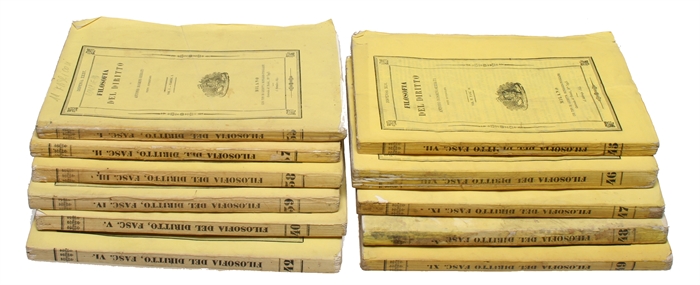PRIVATE PROPERTY AS THE FOUNDATION OF LEGAL LIBERTY
ROSMINI-SERBATI, ANTONIO.
Filosofia del Diritto [i.e. Philosophy of Law]. 2 vols. (11 Parts).
Milano, Boniardi-Pogliani, 1841-45.
8vo. All 11 parts uncut and in the original printed yellow wrappers. A few repairs and minor loss to a few spines, but all in all an excellent, very well preserved set, apart from vol II, fasc. V, in uncut condition and in the rare and fragile original wrappers, as this great work was originally issued. Part V of vol. II has some heavy dampstaining to the front wrapper, whcih thus has a lot of soiling, loss and repair. The front wrapper has been re-enforced with thin paper from verso. The first portion of leaves has some damstaining as well, but only in the beginning. All other parts just have very minor, light, scattered browning internally and some wrappers have a bit of brownspotting. Contemporary owner's name to first title-page (Dr. Professor of Philosophy, Cavallera). 802, (2 - errata); (4), 998, (2, - errata) pp. + final blank.
The rare first printing of this monumental and highly influential treatise, in as original condition as possible - i.e. in the original eleven parts, as it first appeared, all with the original printed wrappers, and all uncut.
It is in the present work that Rosmini presents his fundamental notion of the three societies that are necessary for the full development of the human race. While considering philosophy of law as a science of law, Rosmini here relates law to ethics and happiness and considers how it can be united with the moral creed of man as well as with man's natural urge for happiness. The science of rational right arises from the protection which the moral law affords to the useful good. The ideas of ownership and rights that are governing in our relations to other people are based on freedom and property. In private property Rosmini identifies the foundation of legal liberty and from this legal liberty comes all other laws, specific, individual and social.
The work became hugely influential, not only in Europe, but throughout all of Europe, not least Germany. It was of immediate impact, and especially the liberals embraced it warmly. The work is considered one of Rosmini's main works and probably the most influential. It furthermore served as a basis for many of Rosmini's later works, which also became quite influential.
Antonio Rosmini Serbati (1797-1855)was a famous was Italian Roman Catholic priest and philosopher. He belonged to a noble family, and after having studied at Pavia and Padua, he was ordained priest in 1821. In 1848 Rosmini was invited to serve in the Roman Curia of Pius IX as prime minister of the Papal States. He contributed substantially to many political and religious debates and was an important character in 19th century Italy, most notably in the struggle for Italy's emancipation from Austria. In fact, according to the Italian Printing and the Mind of Man, "Rosmini was, together with V. Gioberti, the most influential thinker during the "heroical" period of the Italian Risorgimento. In 2007 the Catholic church decided to beatify him." (own translation from Italian). Rosmini was eager for the deliverance if Italy from Austria, but his main aim was for the country to become a confederation of states under papal control. Rosmini is furthermore the founder of a new religious community, the Institute of Charity (1828), since then generally known by his name, Rosminians.
Rsomini's opinions and works were met with great opposition, especially among the Jesuits, and several of his works were placed on the Index.
Govi, I Classici che hanno fatto l'Italia, nr. 306.
Order-nr.: 42909

